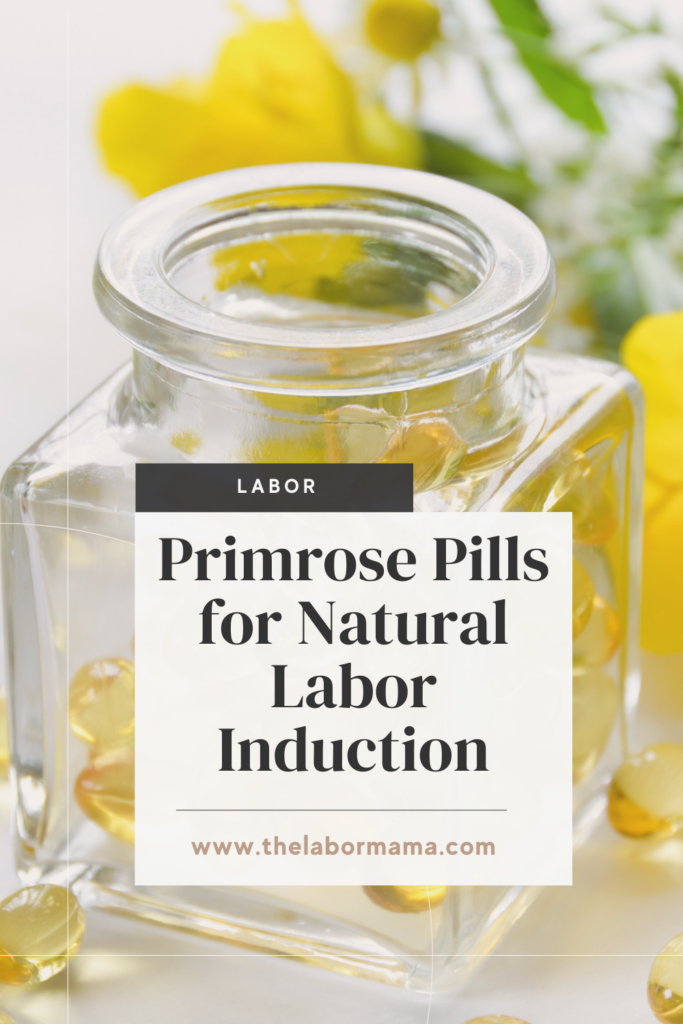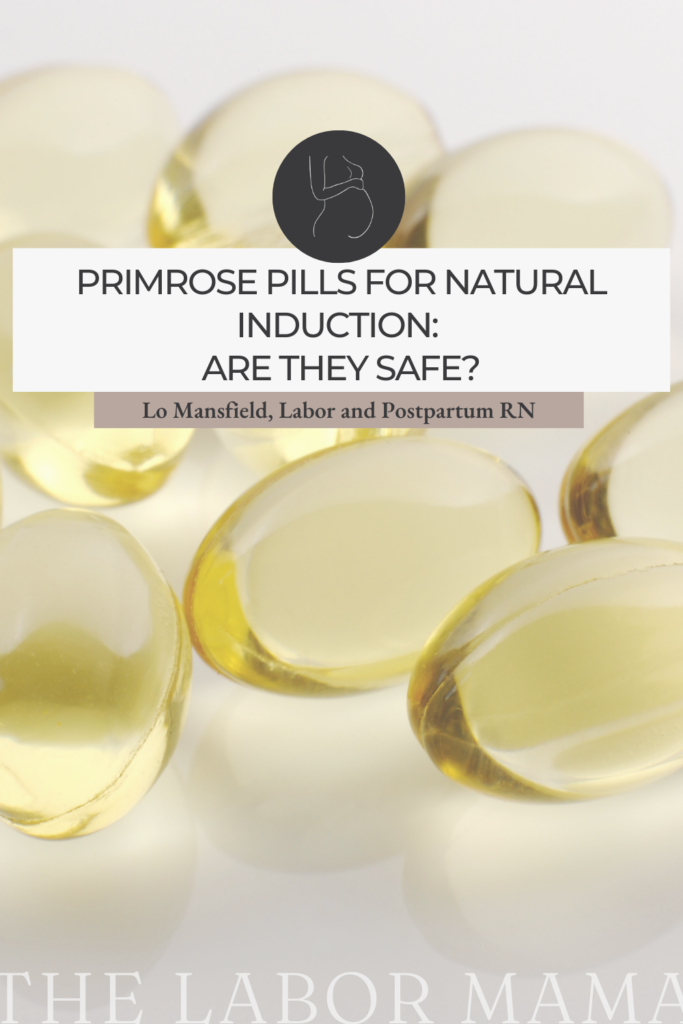Around 38 or 39 weeks of pregnancy, you are probably going to find yourself googling: “How do I naturally induce labor?” And my guess is that you are going to see primrose oil pills pop into the conversation. Let’s talk about this. Haven’t heard of them and wondering what the heck I’m talking about? Is there any evidence about primrose oil pills? Do they actually make labor start? And if so, how? Ok, here we go.

Who is The Labor Mama and Why Am I Here?
Hey friend! I’m Lo – also known around here and social media as The Labor Mama. I’ve spent my nursing career in labor, delivery, and postpartum, have birthed 4 of my own babies, have labored thousands of mamas at the bedside, have taught hundreds of students online, and have even delivered a few speedy little babies with my bare hands (oops).
Here at TLM, I offer online classes to empower you the way everyone should be. The education + support I offer gives you experience, evidence, and empathy; you’re getting all of my years of “clinical” RN knowledge, beautifully combined with my real experiences as a mama and a nurse. These are not your average hospital classes (those won’t do it, I promise), and honestly, birth, postpartum, and breastfeeding don’t follow a textbook or protocol anyway. You need to know so much more than that!
If you want to connect with me further, head to Instagram. There are hundreds of thousands of us over there learning together daily.
A note: This post may include affiliate links. This means if you make a purchase after clicking a link, I will earn a small commission (thank you)! Rest assured, this comes at no additional cost to you. You can read TLM’s full disclosure here.
What are primrose oil pills?
Primrose oil pills are capsules filled with evening primrose oil (EPO). Never heard of it? Guess what? I definitely hadn’t either until I was pregnant with my first and all of my RN co-workers began sharing all of the things they had tried to get their babies out! Someone may or may not have given me a box of their leftover raspberry leaf tea and primrose oil pills too. 🙂
Primrose oil is extracted from the seed of the evening primrose plant. The oil has many active components in it, but one of them, gamma linolenic acid, is the one that may help with “natural” induction. Gamma linolenic acid is a precursor to prostaglandins. Prostaglandins help ripen your cervix and get it prepared for labor. The belief is that if you use evening primrose oil pills, it leads to increased prostaglandin activity. That then helps to ripen the cervix (increase the Bishop score) and get it ready for contractions.

How to take the pills?
EPO pills can be taken orally or inserted vaginally. Most choose to insert them vaginally (kind of like inserting a tampon) up near the cervix. The pills are super affordable and you can find them anywhere that sells OTC medications and supplements. Daily dosages can range between 500 mg and 2000 mg. Want to check out some options? Shop here.
When to start using them in pregnancy
It’s usually recommended that you start EPO after 37-38 weeks of pregnancy. If you are thinking about using the pill, run it by your provider first! You can do this at your 36-week appointment. Don’t forget to ask them what dosage to start with and whether you are free to consume orally or insert vaginally.
How to insert evening primrose oil pills
Personally, I did use EPO pills in all of my pregnancies after my midwives approved it. I chose to insert them vaginally each night, beginning after 38 weeks. Pro tip: The best practice for me was to insert them right before I laid down for bed. I would poke a hole in them first, which really allowed the oil to get out and onto the cervix. I inserted them like you would a tampon without an applicator. Lastly, I also made sure to use a pad liner through the night, because they had a tendency to leak a little bit of oil sometimes.

Other helpful reads:
Midwives Brew: Should You Try This Natural Induction Method?
The Miles Circuit: Can it Induce Your Labor?
Eating Dates Might Help Your Labor: Here’s Why
Is using primrose oil pills for labor induction safe?
I find the evidence about EPO really interesting. Both ways of administration have been studied: orally and vaginally. Primrose oil use also been studied in non pregnant women to see how it can soften the cervix before gynecological procedures. So far, it appears that vaginal administration of EPO is more effective than oral. There is some decent evidence related to the use of EPO and its beneficial effects, but the trials have been small (and we need more research)! According to the research, using EPO pills may:
- shorten the first stage of labor
- improve the Bishop score
- soften/ripen the cervix
We also can’t fully rule out if there are adverse effects from taking it. Right now, there isn’t yet clear clinical consensus or support for its use for cervical ripening. This is why it’s important to chat with your provider as you decide whether or not to use EPO.
This podcast on the topic is great if you want to do a deep dive: EBB Podcast on Evening Primrose Oil for Natural Labor Induction
Does evening primrose oil for labor induction work?
Before I answer that question, I actually think we need to clarify induction. An induction of labor is when labor is not happening – nothing is going on, your water isn’t broken, you aren’t contracting – and you try to do things and/or administer medications to get labor started. EPO pills do not do this! They do not make labor contractions start. Induction really is not the right word for their possible benefit.
What primrose oil pills may do is ripen the cervix. This means it is softer, stretchier, and it may be more dilated or effaced. A cervix that is ripe is more likely to go into labor, especially if contractions begin. If the pills do help, the act on the cervix. They do not actually induce labor! (That’s kind of a vocabulary lesson, but it helps to understand what could happen and how it could impact your labor process).
The takeaway on evening primrose oil pills for induction
It is possible that primrose oil pills may help ripen a cervix for labor. However, evidence is not clear on the risks or benefits of using EPO pills in later pregnancy. If you would like to incorporate this natural induction method at the end of your pregnancy, speak with your provider first! They can help you decide when to begin, how to use them, and what best practice is for you.
Have you tried them? Will you? Do you think they did anything? Let me know in the comments; I’d love some other perspectives! xx – Lo

More resources (and freebies!) for you to take a peek at:





Are you done starting at 37 weeks after getting approval from my OB and I went into labor at 39 weeks! I swear this is the only thing that worked. I did all the things with my first baby and went over my due date.
I’ve done it with all my kids too! I don’t know if it truly helped, but my cervix dilated super fast and labors were quick so maybe?!